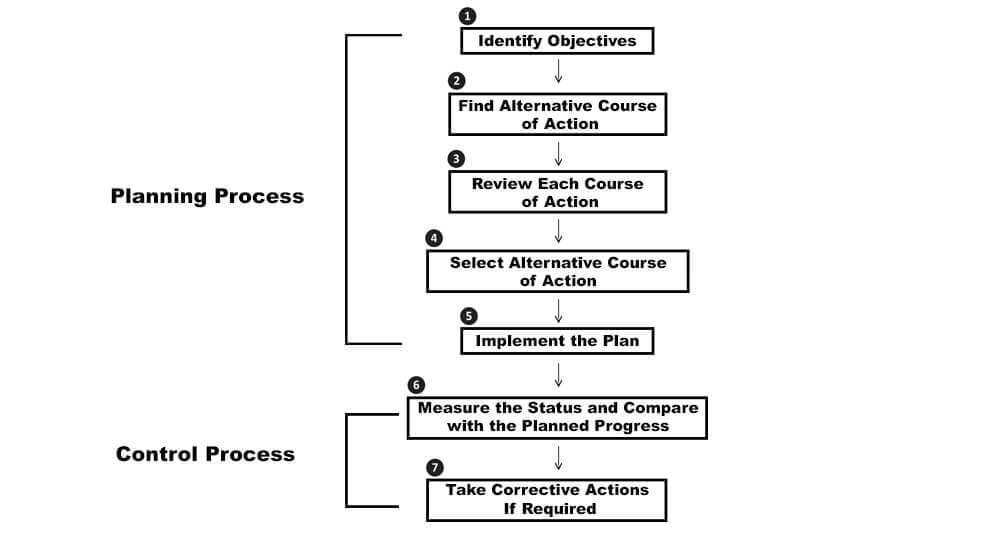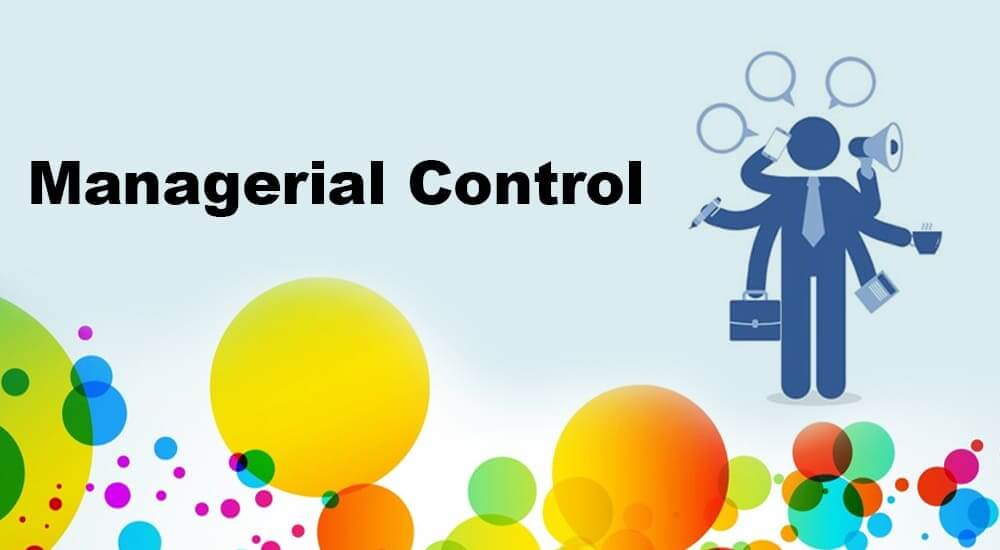Ernest Dale, in his book “Theory and Practice of Management,” has said that:
“The modern concept of managerial control envisages a system that not only provides a historical record of what has happened to the business as a whole but also pinpoints the reasons why it has happened and provides data that enable the chief executive or the departmental head to take corrective steps if he finds he is on the wrong track.”
Further, Koontz, O’Donnell, and Weihrich have said, “Controlling is the measurement and correction of the performance of activities of subordinates in order to make sure that enterprise objectives and the plans devised to attain them are being accomplished.”
Managerial control is about performance evaluations and making decisions that influence the employees to keep progress on track.
Controlling is a measurement and helps individuals adjust the project tasks if required.
In a broader view, managerial control can be defined as the process of evaluating and assessing the current state of a project, finding the difference between the planned and actual progress, and taking corrective actions to mitigate the difference.
There are three major types of managerial control. Output control, as the first one, refers to evaluating measurable outputs.
Behavioral control is the management of actions that lead to results.
The third type is clan control. This is where employees are expected to rely on their values and norms, expectations, and shared traditions to achieve organizational objectives. It is the value and belief that organizations work as a family rather than an organization.
Scope of Managerial Control
The scope of managerial control can be divided into two categories:
- Closed-end management control system
- Open-end management control system
A closed-end management control system is where the flow of information is through the assigned tasks. The results are matched with preset standards and evaluated. If there is a variance, the necessary corrective measures are taken to counter it.
In an open-end management control system, the response is continuous in every phase.
Both systems involve a receptor and a corrector. The figure below depicts the various components of a management control system.
Features of Managerial Control
Managerial control has seven characteristics.
- Continuous Process: Control in management is a continuous process.
- Dynamic Process: Managerial control is non-static. It is subject to adjustment based on performance review.
- Important Management Function: Control is an important management function. Effective control allows easier achievement of managerial functions.
- Mechanism: It is a mechanism in that one is directed to use the set standards to achieve a certain objective.
- Coordinate Integrated System: Control allows incorporating the various processes to achieve project objectives.
- Action-Oriented: Control involves a series of complex and easy tasks to achieve a certain goal. Those activities may be corrected or changed.
- Forward-Looking: Control depends on experience to improve future results.
Significance of Managerial Control
Managerial control is significant in the following:
- Firstly, temptations are omnipresent. Employees are sometimes entrusted with huge amounts of money and valuable company resources. Without control, they may succumb to temptations. Thus, a good control system helps eradicate and minimize such behaviors.
- Secondly, it is nearly impossible to achieve precise performance standards in complex tasks. A manager may depend on continuous responses, which may not always be available; thus, control helps evaluate and ensure that precise and accurate set standards are achieved.
- Thirdly, managerial control guarantees the effectiveness of operations, just like on the road where signals ensure there are no accidents.
A good managerial control system ensures that resources are effectively utilized. Some benefits of an effective control management system include coordination, efficiency, value, high employee morale, operational guidance, managerial accountability, etc.
Process of Managerial Control
Managerial control is a two-phase cycle process. The two phases are planning and control, while the cycle consists of seven stages. The last two stages are related to control, while the rest are planning-related. Planning involves the definition of objectives in the execution of the action. The steps are represented in the figure below.

As mentioned above, the last two steps explain the control process. The essence of control is to monitor the advancement in achieving the objectives. The progress is a continuous process, and checks are carried out in every step during the plan execution.
Requirements to Make Control System Effective
The following are essential requirements for an effective control management system.
- Economical: A good control system’s cost does not exceed the gains from its use.
- Objective: An effective control system should be tailored to conform to the set objectives.
- Error/deviation Alerting: A control system cannot be considered effective if it does not detect errors.
- Organizational Conformity: While performing tasks, the activities must be regulated to ensure that they align with the organizational structure or pattern. A sound control system ensures such activities remain in line.
- Future-Oriented: A control system should concentrate more on future events than past activities.
- Suitability: A control system must be suitable to perform the intended purpose.
- Flexibility: A good control system should incorporate change actions whenever the need for change arises. In the case of failure or breakdown, it should continue performing to maintain operations.
- Understandable: A system must be understandable. The information being fed and displayed must be understandable to the manager.
Pre – Requisites for an Effective Managerial Control System
It is not sufficient to describe a control system as effective if it does not meet the conditions given below.
- Accuracy: Accurate information is necessary for managerial decisions. Inaccurate data may lead to incorrect information, leading to problems or failures.
- Flexibility: The current economic world is highly dynamic. Random technological changes and emerging trends require a flexible control system to accommodate these changes.
- Economic Feasibility: A control system must be economically viable in that it should have a lower operational cost and higher returns.
- Timeliness: Effective control systems should be timely and immediate. It should allow a quick relay of information for effective decision-making.
- Strategic Placements: Controls must be placed at strategic positions where the occurrence of failure or deviation can be detrimental.
Network Techniques and Analysis of Managerial Control
Network analysis is a process of planning and analyzing a project activity. It involves breaking down tasks into smaller pieces that can be easily executed. Identifying tasks that can be performed simultaneously or sequentially is a part of network analysis.
Network analysis is important to managerial functions. It helps in research and development, inventory planning and regulation, launching and advertising new products, installing new equipment, and budgeting and auditing procedures.
A networking technique refers to planning and controlling the progress of a project. Some common techniques are Program Evaluation and Review Technique (PERT), Resource Allocation and Multi-project Scheduling (RAMS), Critical Operating Product Allocation Control (COPAC), and Manpower Allocation Procedure (MAP), to name a few.
Pros and Cons of Managerial Control
Pros
Managerial control is important for effective management. It allows managers to assess the present performance and track it towards the predetermined goals. Some pros of managerial control are:
- It helps delegate authority, duties, and responsibilities to lower-level employees. This helps to develop a sense of involvement among the employees.
- Managerial control plays a major role in the decentralization of organizations.
- Managerial control simplifies supervision within an organization.
- It creates a system where activities and employees are kept under constant checks.
- Managerial control boosts morale, and employees perform their duties efficiently.
- Managerial control ensures overall efficiency.
- Managerial control ensures that wastage of resources is minimized by ensuring that all activities are carried out within the set levels.
- Through quality control, a company can improve quality while lowering costs through cost control. This leads to the production of high-quality products at lower costs.
Cons
Although managerial control is valuable to an organization, it also has shortcomings. Managerial control suffers from the following limitations:
- Managerial control does not control external factors such as competition, government policies, technological advancements, etc.
- Managerial control is often faced by resistance from employees. Exercising control makes some employees feel like their freedom is being reduced.
- Control systems are usually expensive.
- Managerial control limits employees’ freedom and affects their morale.
- Sometimes it is difficult to set quantitative standards. This makes it difficult to track and measure performance.
- Control might be affected by human bias, affecting employees’ morale and efficiency.
Summary
Managerial control helps organizations achieve defined goals with a set timetable. It has three components: measuring performance, taking corrective action, and setting standards. It is a process where managers influence employees to implement strategies defined by the organization.
Managerial control can include a process, tool, policy, or procedure that guides employees to achieve the set targets.
